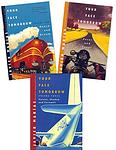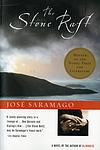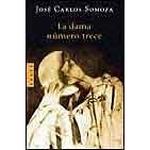The Greatest Portuguese, Spanish "Fiction" Books Since 1980
Click to learn how this list is calculated.
This list represents a comprehensive and trusted collection of the greatest books. Developed through a specialized algorithm, it brings together 300 'best of' book lists to form a definitive guide to the world's most acclaimed books. For those interested in how these books are chosen, additional details can be found on the rankings page.
Genres
Countries
Date Range
Reading Statistics
Click the button below to see how many of these books you've read!
Download
If you're interested in downloading this list as a CSV file for use in a spreadsheet application, you can easily do so by clicking the button below. Please note that to ensure a manageable file size and faster download, the CSV will include details for only the first 500 books.
Download-
1. The Book of Disquiet by Fernando Pessoa
"The Book of Disquiet" is a posthumously published collection of thoughts and musings of a solitary dreamer, who is a Lisbon-based bookkeeper. The book delves into the mind of a man who is discontented with his mundane life and finds solace in dreaming and writing. The narrative is a profound reflection on life, solitude, and the nature of humanity, filled with philosophical insights and poetic language. The protagonist's introspective journey and his struggles with existential despair make it a seminal work in the genre of literary modernism.
-
2. The Year of the Death of Ricardo Reis by José Saramago
The novel is a metaphysical narrative about a doctor named Ricardo Reis who returns to Lisbon, Portugal after learning about the death of his friend. He finds himself in a society on the brink of dictatorship, and as he navigates through his daily life, he encounters his deceased friend's ghost and a hotel maid with whom he begins a love affair. The book explores themes of identity, love, and the nature of reality, set against the backdrop of political turmoil.
-
3. The Shadow of the Wind by Carlos Ruiz Zafon
The novel follows the story of a young boy in post-war Barcelona, who discovers a mysterious book in a hidden library that his father takes him to, which houses forgotten books. The boy becomes captivated by the book and its author, but as he grows older, he realizes that someone is destroying all books written by this author. As he delves deeper into the mystery, the boy's life becomes intertwined with the author's, revealing a dark and tragic past that someone wants to be kept hidden. The story is a mix of romance, mystery, and a historical narrative set against the turbulent backdrop of a city recovering from war.
-
4. Blindness by José Saramago
In this dystopian novel, an unexplained epidemic of "white blindness" sweeps through an unnamed city, causing chaos and panic. The government responds by quarantining the afflicted in an abandoned mental hospital, where conditions quickly deteriorate into violence and squalor. Amid the despair, one woman mysteriously retains her sight and guides a small band of the blind, including her husband, through the harrowing ordeal. The novel explores themes of loss, human nature, and the fragility of civilization.
-
5. Baltasar and Blimunda by José Saramago
"Baltasar and Blimunda" is a historical love story set in 18th century Portugal. The narrative follows a maimed soldier, Baltasar, and a young clairvoyant woman, Blimunda, as they navigate the hardships of life during the Inquisition. Their love story is intertwined with the construction of the Convent of Mafra, a grandiose project initiated by the King. The novel explores themes of love, faith, human resilience, and the struggle against political and religious oppression.
-
6. A Heart So White by Javier Marías
The novel delves into the complexities of relationships, secrets, and communication as the protagonist, a translator and interpreter, grapples with the mysterious suicide of his father's first wife and the pervasive silence surrounding it. Through his own marriage and his observations of others', he contemplates the unsaid and the power of words, both spoken and unspoken. The narrative weaves through time and memory, exploring the impact of the past on the present and the intricate ways in which people understand and misunderstand each other.
-
7. The Club Dumas by Arturo Pérez-Reverte
The book follows Lucas Corso, a book detective who is hired to authenticate a rare manuscript by Alexandre Dumas. As he delves into the investigation, he finds himself entangled in a mystery involving two other books: a rare edition of "The Three Musketeers" and a satanic text, "The Book of Nine Doors of the Kingdom of Shadows". The narrative becomes a complex puzzle as Corso uncovers connections between the books, while also dealing with a seductive woman who seems to have stepped out of a Dumas novel, a mysterious killer, and a group of bibliophiles obsessed with Dumas. The lines between fiction and reality blur as he gets closer to the truth.
-
8. Bartleby & Co by Enrique Vila-Matas
"Bartleby & Co" is a metafictional work that explores the theme of "writers of the No," authors who cease to write or never start at all. The narrator, an office worker on sick leave, uses footnotes to a nonexistent text to delve into the stories of these authors, including famous real-life figures. The book serves as a meditation on silence, refusal, and the nature of literature itself.
-
9. Your Face Tomorrow: Fever and Spear by Javier Marías
The novel explores the life of a Spanish expatriate in England who is recruited by a secretive organization due to his unique ability to interpret people's behavior. As he becomes entangled in a world of espionage, he grapples with moral and ethical dilemmas, questioning the validity of his work and the consequences of his actions. Through a blend of introspective musings and suspenseful narrative, the protagonist's life unravels, revealing a complex web of deceit, betrayal, and violence.
-
10. The Gospel According To Jesus Christ by José Saramago
This novel offers a provocative and humanized retelling of the life of Jesus Christ, diverging from traditional biblical narratives. It presents a Jesus who is all too human, grappling with the complexities of life, love, and a sense of destiny. Through a blend of biblical lore and imaginative fiction, the story explores themes of divinity, free will, and morality, challenging readers to reconsider the foundations of faith and the nature of storytelling itself. The narrative delves into Jesus's relationships, his encounters with figures such as God and the Devil, and ultimately portrays a deeply philosophical and introspective version of a figure central to Western civilization.
-
11. Larva: Midsummer Night's Babel by Julián Ríos
"Larva: Midsummer Night's Babel" is a complex and innovative novel that explores the nature of language and the power of words. It's a narrative labyrinth that follows a group of characters through the streets of London on a midsummer night, as they engage in a series of intellectual debates and discussions. The story is filled with puns, word games, and literary references, and is written in a unique style that blends poetry and prose. The novel is also a satire of the literary world, with the characters often critiquing and parodying various literary styles and authors.
-
12. Fado Alexandrino by António Lobo Antunes
"Fado Alexandrino" is a complex narrative that follows the lives of four Portuguese men who meet at a dinner in Lisbon to commemorate their return from the colonial war in Mozambique ten years prior. Each man, representing different social classes, recounts his life before, during, and after the war, revealing their personal struggles and the impact of the war on their lives. The novel also reflects the political and social changes in Portugal from the dictatorship era to the revolution and its aftermath.
-
13. Obabakoak by Bernardo Atxaga
Obabakoak is a collection of interconnected stories that revolve around the inhabitants of a fictional Basque village named Obaba. The stories, which are a blend of the magical and the everyday, explore the complexities of human nature, as well as the rich history and culture of the Basque region. Themes of love, fear, tradition, and change are woven throughout, offering a nuanced and evocative portrait of a community and its people.
-
14. All Souls by Javier Marías
"All Souls" is a novel that follows the experiences of a Spanish professor teaching at Oxford University. His life is filled with eccentric colleagues, a puzzling love affair, and a mysterious sense of intrigue. As the protagonist navigates through the academic world, he becomes entangled in a web of personal relationships and bureaucratic intricacies. The book is a blend of romance, suspense, and satire, with a poignant exploration of memory, longing, and the ephemeral nature of human relationships.
-
15. The History of the Siege of Lisbon by José Saramago
This narrative revolves around a proofreader named Raimundo Silva, who, while working on a historical text about the Siege of Lisbon, decides to alter history by adding a single word to the text, turning the factual account into a fictional one. This act of rebellion leads him into a relationship with his boss, Maria Sara, and together they explore the consequences of questioning historical facts and narratives. The story also delves into the power of language and storytelling, and the blurred lines between history and fiction.
-
16. The Return Of The Caravels by António Lobo Antunes
In this novel, the ghosts of Portugal's colonial past return to haunt the present, as the caravels from the age of exploration sail back into the Tagus River, bringing with them the historical figures from the 15th and 16th centuries. The narrative weaves together the lives of these returned explorers with those of contemporary Lisbon's denizens, blurring the lines between past and present. Through a series of interconnected stories, the book explores themes of identity, nostalgia, and the complex legacy of colonialism, as characters grapple with the dissolution of the Portuguese empire and the reintegration of its former colonies, reflecting on the impact of history on individual lives and national consciousness.
-
17. Treaty Of The Soul's Passions by António Lobo Antunes
"Treaty of the Soul's Passions" is a profound exploration of human emotions and the complexities of the inner self. Through a series of interconnected stories and reflections, the narrative delves into the depths of love, despair, joy, and suffering, painting a vivid picture of the human condition. The author masterfully weaves a tapestry of characters and experiences, each revealing different facets of the soul's journey through life. With poetic language and rich psychological insight, the book invites readers to confront their own passions and question the nature of existence itself.
-
18. A Light Comedy by Eduardo Mendoza
"A Light Comedy" is a humorous tale set in Barcelona during the 1940s, centered around a middle-aged woman who, after losing everything in the Civil War, uses her wits and cunning to survive. She turns her apartment into a boarding house for single ladies, but when the business starts to falter, she decides to concoct a plan to marry a rich American. The novel is filled with a colorful cast of characters, and is a satirical commentary on the social and political climate of the time.
-
19. Karingana Ua Karingana by José Craveirinha
"Karingana Ua Karingana" is a collection of poetry that delves into the rich cultural heritage and history of Mozambique. Through vivid and evocative imagery, the author explores themes of love, loss, and the struggles faced by the people of his country. Craveirinha's powerful and poignant verses offer a glimpse into the complexities of Mozambican society, while also celebrating its resilience and beauty.
-
20. The Heretic by Miguel Delibes
"The Heretic" is a historical novel set during the Spanish Inquisition. It follows the life of a man born in 16th century Spain, who, despite being raised in a strictly Catholic environment, begins to question the teachings and practices of the Church. As he grows older, he becomes involved in the Protestant Reformation, risking his life in a society where heresy is punishable by death. This book explores themes of faith, religious persecution, and the struggle for freedom of thought.
-
21. The Stone Raft by José Saramago
In this surreal exploration, the Iberian Peninsula breaks off from the rest of Europe and begins to drift across the Atlantic Ocean. As the governments and international community scramble to understand and respond to the phenomenon, five disparate individuals find themselves drawn together on a journey across the newly isolated landscape. Through their experiences and interactions, the narrative explores themes of identity, nationality, and the arbitrary nature of borders.
-
22. Soldiers of Salamis by Javier Cercas
This novel revolves around a true event during the Spanish Civil War, where a nationalist soldier spares the life of a famous poet who was about to be executed. The story is told from the perspective of a journalist who becomes obsessed with the incident and embarks on a quest to uncover the truth about what happened. As he delves deeper, he discovers the complexities of heroism, history, and memory, and is forced to question his own understanding of these concepts.
-
23. La Dama Número Trece by José Carlos Somoza
This novel is a thrilling blend of mystery, horror, and fantasy, revolving around a struggling writer who becomes the target of a secret society known as "The Thirteen Ladies". These shadowy figures have the ability to manipulate reality through the power of words and storytelling. As he is drawn deeper into their world, he must uncover their secrets and find a way to survive their deadly games. The narrative is a rich exploration of the power of language and mythology, with a suspenseful plot that keeps readers on the edge of their seats.
-
24. Terra Sonâmbula by Mia Couto
"Terra Sonâmbula" by Mia Couto is a captivating novel set in war-torn Mozambique, where two individuals, a young boy and an old man, cross paths and embark on a journey that intertwines their lives. Through their encounters with other characters and their shared experiences, the book explores themes of loss, displacement, and the power of storytelling to heal and provide hope in the face of adversity. The lyrical prose and magical realism elements create a rich and evocative narrative that immerses readers in the complex and haunting world of post-colonial Mozambique.
-
25. Cain by José Saramago
The novel explores the biblical story of Cain and Abel from the perspective of Cain, after he murdered his brother. The author reimagines the Old Testament by having Cain time travel to key events and interact with biblical figures such as Noah and Abraham, challenging the traditional interpretations of morality, justice, and faith. Cain's journey reveals a critical view of God and the paradoxes of the human condition.
Reading Statistics
Click the button below to see how many of these books you've read!
Download
If you're interested in downloading this list as a CSV file for use in a spreadsheet application, you can easily do so by clicking the button below. Please note that to ensure a manageable file size and faster download, the CSV will include details for only the first 500 books.
Download






















